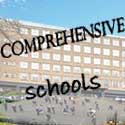Comprehensive schools: the levelling of society

Comprehensive schools were set up as the answer to the unfair and unhelpful divisions in society causing children as young as 11 being labelled for life as not good enough for grammar schools. This page elaborates.
____
By the webmaster based on hearing the arguments when comprehensive schools were first envisaged and discussions with their former-pupils
The arguments for comprehensive education
In view of all the problems associated with secondary modern schools, it had often been argued that it would be better for all children of all backgrounds and abilities to be educated in the same local school. Any one classroom base would have children of mixed abilities but the children would be streamed according to ability for each subject together with children from other class bases. This was known as comprehensive education.
Comprehensive schools arrive
The argument for comprehensive education gained ground after the Second World War once the money slowly became available to put a suitable policy into practice. Such schools were known as comprehensive schools, and they started to become widely available around the early 1960s with subject streaming catering for different children's abilities.
Some new schools were built but there were many existing schools, both grammars and secondary moderns that merged, with their new designation changing to comprehensive.
Comprehensive state schools are commonplace today and have probably lost the comprehensive designation. They are now just local schools.
The slow acceptance of comprehensive schools
As with most new things, comprehensive education was not universally welcomed:
Effects on parents
Parents who thought that their children were sufficiently able for a grammar school education tended to regard comprehensives as down-market. I saw a great deal of this as my own children were growing up. In contrast, presumably parents of children who would otherwise be going to secondary moderns welcomed the change, but of course they did not talk about it.
Effects on teachers
Neither was it easy for the teachers. Many teachers from the grammar schools objected to their change of employment status and having to teach less able intakes. So many of the older teachers retired early. Neither was it automatic that all the teachers in the former second moderns felt comfortable having to teach the top streams to a higher academic level than they were used to. These problems were largely accommodated with the former grammar school teachers teaching the top streams and the former secondary modern teachers teaching the lower streams.
Effects on children
The children too had to get used to the change. In the early years of comprehensives, I did see children who might otherwise have gone to grammar schools seeming to lose some pride in their schools. However the trade-off was that children who might otherwise have gone to secondary moderns did not regard themselves as failures. In this respect comprehensives represented a form of levelling in society.
All new developments take time to settle down and comprehensive education was no exception. Presumably it is now well over its teething problems and few people would want to go back to divisive grammar schools and secondary moderns.
Remaining grammar schools
Some grammar schools did remain, particularly in Wales, and from my viewpoint, the authorities seemed to turn a blind eye to the effective discrimination.
| sources | webmaster | contact |
Text and images are copyright
If you can add anything to this page or provide a photo, please contact me.



